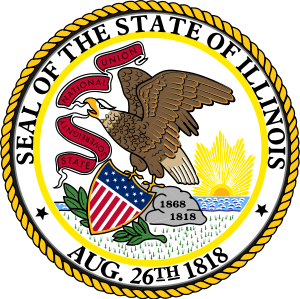Richard Yates Jr.
| Richard Yates Jr. | |
|---|---|
 | |
| 22nd Governor of Illinois | |
|
In office January 14, 1901 – January 9, 1905 | |
| Lieutenant | William A. Northcott |
| Preceded by | John R. Tanner |
| Succeeded by | Charles S. Deneen |
| Member of the U.S. House of Representatives from Illinois's at-large district | |
|
In office March 4, 1919 – March 3, 1933 | |
| Preceded by | Medill McCormick |
| Succeeded by | Walter Nesbit |
| Member of the Illinois House of Representatives | |
| Personal details | |
| Born |
December 12, 1860 Jacksonville, Illinois, U.S. |
| Died |
April 11, 1936 (aged 75) Springfield, Illinois, U.S. |
| Political party | Republican |
| Spouse(s) | Helen Wadsworth |
| Children | ? |
| Residence | Jacksonville; Springfield; Harbor Springs, Michigan |
| Alma mater |
Illinois College University of Michigan |
| Occupation | Attorney; County judge |
| Profession | Politician |
| Military service | |
| Service/branch | United States National Guard |
| Years of service | 1885–1890 |
| Rank | Private |
| Unit | Illinois |
Richard Yates Jr. (December 12, 1860 – April 11, 1936) was the 22nd Governor of Illinois from 1901 to 1905 — the first native-born governor of the state. From 1919 to 1933, he served in the U.S. House of Representatives from Illinois. Although he failed to receive his party's nomination in 1928 to the Seventy-first Congress, he was later appointed nominee and elected in place of Henry R. Rathbone who died prior to the election. In 1932, he was unsuccessful in his bid for reelection to the Seventy-third Congress.
His father, also Richard Yates, was also an Illinois politician; indeed the senior Yates was Illinois' popular Civil War governor, and the younger Yates spent a portion of his boyhood living in the Executive Mansion in Springfield, which would one day again be his home. The son was born in Jacksonville, Illinois and attended public schools and, from 1870 to 1874, the Illinois Woman's College (now MacMurray College). He was the city editor of the Daily Courier in 1878 and 1879, and of the Daily Journal 1881–1883. Yates graduated from Illinois College in Jacksonville in 1880 and from the law department of the University of Michigan at Ann Arbor in 1884. He practiced law in Jacksonville and was city attorney of Jacksonville 1885–1890 and county judge of Morgan County 1894–1897. From 1897 to 1900 Yates was United States collector of internal revenue for the eighth internal revenue district.
In 1900, Yates was elected governor in his own right, at not yet 40 years of age. He began his campaign in a "dark horse" capacity under the cloak of neutrality, which won him support from Senator Shelby Moore Cullom's "federal crowd". Congressman William Lorimer, who had backed another candidate in a field of well-known men, suddenly switched at the Republican convention, grabbing up a Yates banner and proceeding to stampede the convention. This played out with the results of the third ballot never being announced; Yates was then nominated on the fourth. The subsequent election, decisive, sent Yates to the governor's chair, by 61,233 votes over Democrat Samuel Alschuler of Aurora.
The keynote legislation signed during the governorship of Richard Yates was a new child labor law, the first of its kind in any state, restricting the work week of children to no more than 48-hours. Another significant move of the administration, was the signing of a bill permitting municipal ownership of street railways. Yates restricted prison industries, but vetoed a bill calling for a centralized audit of all state agencies. The veto is significant, in light of the Chicago press of the day. Highly critical of the stylish governor, who retained the parade pomp of John Tanner and his "sunburst colonels", Chicago newspapers reported Yates Jr. as compelling state employees to contribute to a slush fund. Further accusations, had it that campaign work was compulsory for state employees, under Yates.
In 1904, Yates was the first Republican West of the Ohio, to declare for Theodore Roosevelt. An ironic side note, is that at the tail end of his political career, driven from Congress by the landslide which carried TR's distant cousin, Franklin Delano Roosevelt, and an overwhelming number of Democratic candidates into office, Richard Yates Jr. of Illinois polled more votes than any other Republican in the state.
Yates, despite being a sitting governor, did not receive his party's nomination in 1904; he led the field of six candidates for 58 ballots, before throwing support behind State's Attorney Charles S. Deneen, in order to prevent the nomination of Frank O. Lowden, Yates' chief rival at the convention. In his years prior to Congress, Yates was popular on the chautauqua circuit, as well as working patronage jobs, such as serving in charge of telephone companies, as a member of the state utility commission.[1]
Yates served as a private in Company I, Fifth Infantry, Illinois National Guard from 1885 to 1890.
His final act of service was to cast a vote in 1933, against repeal of the 18th Amendment (Prohibition). After leaving Congress, Yates resided in Harbor Springs, Michigan, and Springfield, Illinois, while writing his memoirs. He died in Springfield and was buried in Diamond Grove Cemetery, Jacksonville.
References
![]() This article incorporates public domain material from the Biographical Directory of the United States Congress website http://bioguide.congress.gov.
This article incorporates public domain material from the Biographical Directory of the United States Congress website http://bioguide.congress.gov.
| Political offices | ||
|---|---|---|
| Preceded by John R. Tanner |
Governor of Illinois 1901–1905 |
Succeeded by Charles S. Deneen |
| U.S. House of Representatives | ||
| Preceded by Medill McCormick |
Member of the U.S. House of Representatives from Illinois's at-large district 1919–1933 |
Succeeded by Walter Nesbit |
